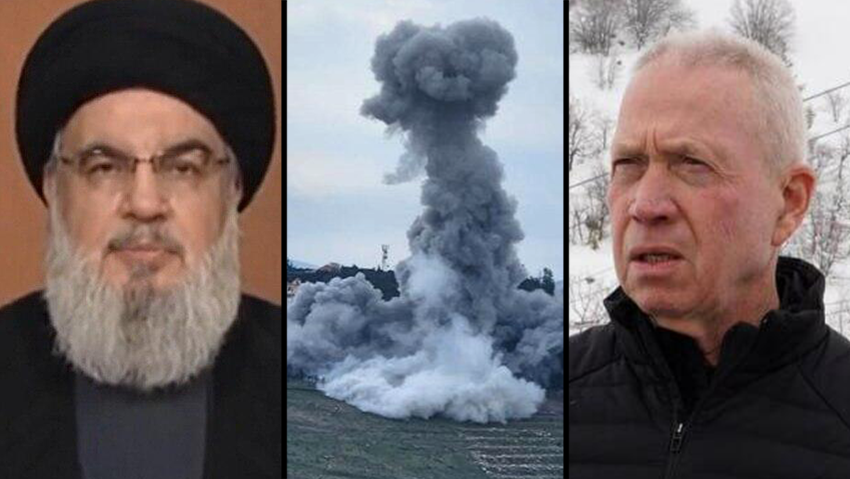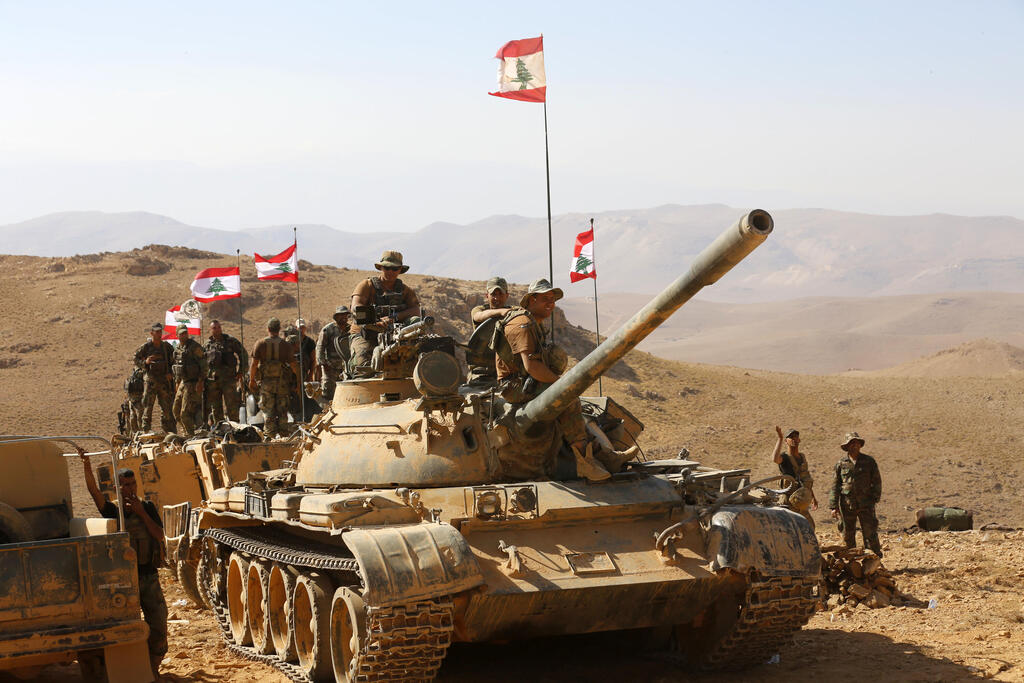Getting your Trinity Audio player ready...
Lebanon, a nation plagued by disasters, conflicts and crises, stands at a critical juncture. The country recognizes that any future agreement to prevent war with Israel will likely require the full implementation of UN Resolution 1701, which mandates a significant strengthening and restructuring of its military. To achieve such changes, Lebanon will need substantial external assistance.
The Lebanese Armed Forces, one of the few remaining national consensus in the fragmented country, rely heavily on Western support. The military's outdated equipment and limited capabilities pale in comparison to Hezbollah's strength.
3 View gallery


US envoy Amos Hochstein's meeting with Lebanese Prime Minister Najib Mikati in Beirut
(Photo: Dalati Nohra/Handout via REUTERS)
Lebanon understands that it must stabilize, strengthen and enhance its military to enforce the presence of Hezbollah terrorists far from the border with Israel—a move that could ensure peace for both southern Lebanon and Israel.
Hezbollah-affiliated Lebanese newspaper Al Akhbar reported that U.S. envoy Amos Hochstein's visit to Beirut on Wednesday included discussions on bolstering the Lebanese military. While the visit was described as "incomprehensible" in diplomatic terms, Al Akhbar noted that Hochstein's conversation with Lebanese Army Commander Joseph Aoun focused on the army's preparedness and needs, particularly in the context of a potential wide-scale deployment in southern Lebanon to maintain stability.
The newspaper also reported that, prior to Hochstein's meeting with Lebanese Prime Minister Najib Mikati, the cabinet approved the recruitment of 1,500 additional soldiers for the Lebanese army. Mikati presented Aoun's plan to enhance the capabilities of units deployed in southern Lebanon and to implement Resolution 1701, noting that the army's presence in the south had been reduced since 2014 to address other challenges.
Mikati emphasized the importance of this plan in the context of Lebanon's fragile situation and the broader Middle East, as international representatives visiting Lebanon continue to demand the implementation of Resolution 1701, which Hezbollah has violated.
According to Al Akhbar, the recruitment plan includes a phased enlistment of 6,000 soldiers, with further improvements and coordination with donors required. The initial approval granted Wednesday covers the recruitment of 1,500 soldiers, down from the 2,000 initially proposed, due to budget constraints.
Crowding at Rafic Hariri Airport in Beirut due to residents fleeing
In recent months, discussions about the future implementation of Resolution 1701 and the need to bolster Lebanon's military have intensified, particularly in light of ongoing hostilities.
Last week, the Lebanese government circulated a document outlining guidelines for achieving long-term stability in southern Lebanon. The document emphasized the need to reduce escalation in the short term and called for the full implementation of Resolution 1701 and the recruitment of soldiers. It highlighted that Resolution 1701 is the cornerstone for ensuring stability and security in southern Lebanon, with UNIFIL and the Lebanese army responsible for its enforcement.
The government expressed its commitment to increasing military personnel through recruitment, considering it a crucial step in enhancing the Lebanese army's ability to maintain security and stability in the region.
The issue of military recruitment has been a recurring topic in recent months. In June, Asharq Al-Awsat reported that any future agreement on the Lebanon-Israel border would include strengthening the Lebanese army through recruitment, training and equipment, enabling it to control the area south of the Litani River alongside UNIFIL forces.
Western and Arab countries are aware of the Lebanese army's need for assistance to change the situation in the south, a point army chief Aoun has reiterated in recent international meetings.
In recent months, Lebanon has approached the international community, seeking support for its military to fulfill its role. In March, a Lebanese newspaper reported that a Gulf state expressed willingness to fund the recruitment of 7,000 soldiers for the Lebanese army. The question now remains whether Israel will give these efforts a chance and whether it can once again trust promises to keep southern Lebanon free of Hezbollah—a commitment that has failed in the past.
UN Resolution 1701
UN Resolution 1701, which is now at the center of discussions aimed at preventing a war in northern Israel, was adopted on August 12, 2006—exactly one month after the outbreak of the Second Lebanon War and the abduction of two Israeli soldiers, Eldad Regev and Ehud Goldwasser.
The resolution called for the deployment of a UN peacekeeping force alongside the Lebanese army in southern Lebanon and the removal of Hezbollah from the border region, pushing the terrorist group north of the Litani River.
At the time, the Israeli military was preparing for a large-scale ground operation to capture the area up to the Litani River in an effort to decisively defeat Hezbollah. However, the operation was halted when a cease-fire took effect on August 14, two days after it was declared and approved by both the Israeli and Lebanese governments.
3 View gallery


Hezbollah Secretary-General Hassan Nasrallah; defense Minister Yoav Gallant
(Photo: Defense Ministry)
According to the UN resolution, an enhanced UNIFIL (United Nations Interim Force in Lebanon) was supposed to be established, building on the force that had been stationed as a buffer between Israel and Lebanon since the conclusion of Operation Litani in 1978. The international force, comprising soldiers from foreign armies, was tasked with preventing armed Hezbollah operatives from operating near the border.
However, by 2006, UNIFIL had largely failed in its mandate, with Hezbollah growing stronger and more entrenched along the Israeli border, despite the UN's efforts to change the situation. Resolution 1701 called for the deployment of 15,000 armed UN troops to assist the Lebanese army in securing the southern region. The resolution also stipulated that no weapons should be present in southern Lebanon without the Lebanese government's consent and imposed an arms embargo on Hezbollah.
A month after the resolution was passed, reinforced UN forces and the Lebanese army were deployed in southern Lebanon, but even then, they failed to fully uphold their responsibilities under the agreement. Since then, numerous skirmishes have occurred between Hezbollah and Israeli forces.
Following the Second Lebanon War, Hezbollah, backed militarily and financially by Iran, rebuilt its arsenal, growing into a powerful, well-armed force capable of striking most of Israel.
Hezbollah Secretary-General Hassan Nasrallah has repeatedly said that he will not consider a political settlement with Israel to end the current hostilities on the northern border unless a cease-fire is first achieved in Gaza.
The ongoing international efforts to strengthen the Lebanese army come amid fears of a broader escalation, particularly following Nasrallah's vow to avenge the killing of his deputy, Fuad Shukr, and Iran's promise to retaliate for the assassination of Ismail Haniyeh in Tehran.







